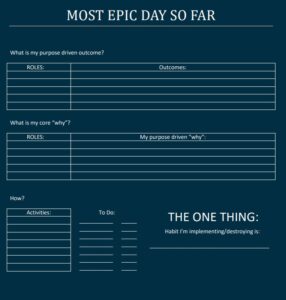“We don’t respond to what happens, we respond to our perception of what happens.” Gabor Mate
This quote will be useful to us later on but before we discuss it I want to share with you our upgraded schedule. We’ll be planning on a weekly basis from now on.
That’s why we’re adding a small “TO DO” segment where you won’t go through the process of writing down your “why” beforehand and writing down your outcome, but it’s used to remind you of
tasks that are a must and can’t be forgotten, meet-ups or meetings for example that you will plan out in advance.

It’s much easier to schedule things on the spot with other people as well, when you have your whole week in your head instead of just one day.
What we’re also adding in this week is “the one thing”. This will be our measure of success. What is “the one thing”?
Well, most of us our striving towards reaching our goals and achieving success and we don’t even have a metric for success.
What I found out is that no matter how much I achieved is that if there’s a habit you’re trying to get rid of or implement, and you’re postponing it, it will bug you and get in the way of you feeling
successful.
Also on the other side, and I’ve been guilty of this countless times myself, we tend to demand more and more from ourselves and bring ourselves down with our own over the top rules of what being successful means.
So someone may set rules that they’re not successful unless they’re at 10% body-fat and they’re at 11% currently, make 2 million $ a year and they’re making 1 million currently, have three women at a time and they have two, or have 3 kids and they have two. You get the picture.
It’s a never-ending game and you will never be fulfilled. There’s a difference between striving to be better and setting rules which determine whether you’re successful or not.
This is why we’re using something simple as “the one thing”, a single habit you’re either trying to build or avoid that will, if avoided or followed through, be a measure for your success.
Now that we’ve got the planner out of the way let’s return to our emotional mastery segment.
One of the most important things I learned from dr. Gabor Mate is that we don’t respond to events but rather we respond to the meaning we assign to the event.
I’ll share with you a tool that will be of value to you when it comes to mastering your emotions.
I’m sure that there’s a time where you misinterpreted someone and got mad for quite some time, only to find out later that that’s not what the person meant, you just interpreted it that way.
Emotional mastery tool:
1. When was the last time you were moved off-center?
- What was your emotional reaction?
- What made you feel that way (hint: it’s not the event, but the meaning you gave it)
- What are some other potential explanations of the event?

